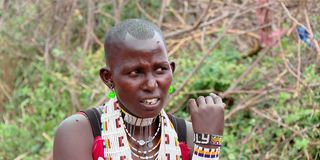Joy as remote community gets its own health facility

Naserian Saidi during the interview in Torosei, Kajiado County on July 10. She has been seeking healthcare services in Tanzania for a long time.
What you need to know:
- Residents of Torosei in Kajiado County have been crossing the border to Tanzania in search of medical care, a long journey that did not only put their lives at risk but also left them poor due to the high cost of transport.
Naserian Saidi, a mother of six, has been tirelessly travelling long distances in search of medical care for years.
She lives in Torosei, a location situated in the western part of Kajiado County, which is surrounded by rolling hills and vast fields; creating a picturesque but isolated setting.
Last year, her relentless quest for healthcare ended in tragedy when her neighbour, whom she was travelling with to seek medical attention, lost her child.
That is not a lone case. Access to healthcare has haunted most residents of Torosei for years. It has been a matter of life and death, and it is especially challenging during the rainy season when the roads become impassable.
Most residents here cross the border to the neighbouring Tanzania to access healthcare services, a difficult and often dangerous journey.
The trip to Tanzania has not only been long and tiring but also filled with risks such as wild animals and unpredictable weather conditions.
At the village, there are no healthcare facilities within a reasonable distance. The nearest hospital is about 50 kilometres away and the only option is crossing the border to Tanzania.
Saidi, together with her neighbour whose kin was unwell, embarked on a journey to find healthcare services. They left for Namanga, Tanzania hoping to get treatment at Mamboleo Hospital.
As they were about to reach the border town of Namanga, covering about half the distance, the neighbour’s child’s condition took a turn for the worse. He began to struggle for breath, and in no minute, he died in her arms.
Saidi continued with the journey alone since she was also taking her child for treatment. She left behind the neighbour to bury the child and go back home.
“We have had several cases where people lose their loved ones just because of the distance and the process of getting treatment when one is unwell. Apart from just the distance, the fare to the hospital and even means of transport here is a problem. Many would rather sit and take traditional medicines rather than struggle to seek care,” she tells Healthy Nation.
She adds that there are two options for receiving treatment; one is to walk for three hours to get to Bisil, Kajiado, and the other is to travel by motorbike to access Kajiado County Referral Hospital. Choosing the latter means parting away with about Sh1, 200, which is expensive for an uncomfortable motorcycle ride.
“Many times when we go to Bisil, they are unable to handle serious medical conditions. We are often told to buy drugs, which is why we usually cross the border to Tanzania in the hope of getting the help we need,” Saidi says.
Medical travel to Tanzania has cost the lives of most of the people in her village. Saidi has never had the freedom to step into a labour ward and has never been to any maternity ward. She has given birth to all six of her children at home.
Her journey of bringing life into this world has been forged at home, a testament to resilience and making use of the only available and within her reach option, a traditional birth attendant.
“For many people, the idea of not having a hospital nearby is unimaginable,” she reflects. “But for us, it’s a part of life. We adapt and make the best of what we have.”
Each of her subsequent births brought its own set of challenges. The unpredictability of childbirth meant that complications were always a possibility.
“There were moments of fear,” she admits. “But the fact that it was the only option and under the care of a traditional birth attendant, gave me confidence.” Fortunately, she has never lost a child. “If there was a facility nearby, I would not have given birth to all my children at home,” she says.
But the narrative has changed.
Today, Torosei location stands as a testament to the transformative power of accessible healthcare, thanks to the recent establishment of a new health facility for this isolated community.

The Reproductive Health Network Kenya health centre in Torosei, Kajiado County.
Through an initiative by the International Planned Parenthood Federation (IPPF) and Reproductive Health Network Kenya, a five-roomed health facility has been constructed in Torosei location. The development has been a lifeline for the residents, drastically reducing the distance and effort required to access medical care.
Ms Nelly Munyasia, executive director of the Reproductive Health Network- Kenya, says the network has taken leadership in establishing the facility because it wants to reach out to underserved populations.
“Putting up the Naretisho facility was quite a journey. We started looking for space two years ago and we were looking at what numbers were telling us, counties that had high numbers of teenage pregnancies, school dropouts and high maternal child death,” she explains.
While on a feasibility study in Kajiado West, they came across faces of disconcerted residents who could not stand seeing their hallucinating kin capitulate to their struggles.
“It is one of our network providers who suggested the place because once a month, she would take services to the people at Torosei location and would attend to over 300 clients in a day; and this was overwhelming,” she says.
And since it was volunteer work, she couldn’t provide all the critical services due to the limited resources.
“I thought, why not set up a facility near homesteads for the sake of our expectant women, children and even the older women? I wanted to address the accessibility, affordability, and availability of healthcare services. I wanted our expectant women to have a place to give birth, where they could get reproductive health information and services whenever they wanted them. It is not a favour I am doing them; it is their right to access these services,” Ms Munyasia tells Healthy Nation.
“I want the women here to feel as supported as those in urban and peri-urban areas. In urban areas, there are many private facilities, unlike here. This is unfair because women here also need these services. I aim to help the vulnerable and marginalised rural women who struggle to access necessary services due to distance and availability,” she adds.
The facility manned by trained healthcare professionals, nurses, clinical officers and subordinate staff attends to over 300 clients on a market day and about 150 residents on other days. It provides comprehensive safe motherhood services (antenatal care, postnatal care, deliveries) and maternity services at Sh3,000.
All forms of modern contraceptives are provided at the facility, including general medical consultations, vaccinations, emergency services, treatment of chronic illness and rapid test and counselling services.
For those unable to pay, she adds, the bill is waived. They work closely with the community health promoters, the village administrator and the chief, who identify the very needy cases and refer them to the facility. When they come with the referral, the cost is taken care of.
“With the facility up and running, my happiness is not seeing women take the long distance to a facility to seek services using a motorbike, which is torturous to a pregnant woman. The fact that we can bring a facility closer to the community is very satisfying and, in a way, we are contributing to the reduction of maternal and child mortality in the community.”
She says that with a network of healthcare providers in 44 counties, the organisation ensures that women and girls have diverse access to comprehensive sexual reproductive health information and services.
“We work closely with the Ministry of Health to ensure that we have policies that support access to services, and with the counties to ensure that they are implementing the policies, as implementation has been a problem.”
Rebecca Kedong, a resident of Torosei, tells Healthy Nation that she lacks words to thank the masterminds behind the establishment of the health facility in their location.
“This facility has helped us because a while back we didn’t have any health centre around here and sometimes going all the way to Kajiado District, which is 50 kilometres away, would be tiresome and full of challenges. It has helped a great deal,” says Rebecca.
“During the rainy season, even in emergencies, no one would attempt to travel to seek medical care. Even now that the rainy season is over, the distance and the fare to the hospital are still too much for us to afford. Expectant women would die in their houses with nowhere to turn to. Thanks to the Reproductive Health Network, we now have a closer facility whenever we are in need,” she adds.
She narrates how recently a woman successfully gave birth to twins at the facility. One developed a complication and was rushed to Bisil, and was helped.
“Had it not been for this facility, we would have lost the lives of the women and their children. At the facility, we can get clinics for the women, and children, family planning services, tests and general treatment,” she explains.
Saidi and Rebecca are a representation of thousands of women in Kajiado County whose stories are a testament to the strength and resilience of those who face unimaginable hardships in their search for basic medical care. Their journey, marked by desperation, and loss, underscores the urgent need for improved healthcare infrastructure in the country.
According to data by the Kenya Health Facility Census Report 2023, only two per cent of the sampled facilities in Kajiado County offered basic outpatient services, with most of the hospitals being far. This forces desperate patients to walk unimaginable distances to access outpatient services.
The report by the Ministry of Health showed that only 10 per cent of public health institutions are equipped to deliver basic services.
The report states that for the provision of quality primary health care services, the level three facilities should have at least three nurses, a clinical officer and a laboratory technician at the bare minimum. From the findings, 97 per cent of level three facilities had less than three nurses. This means that out of 10 level two facilities in Kajiado, nine had less than three nurses as a requirement by the Ministry of Health.
The findings indicated that only 26 counties had all the required staff, at least three nurses, a clinical officer and a laboratory technician in each of their level three facilities.
The country is also facing a shortage of critical care services, with less than half of the assessed 12,375 health facilities offering critical services. Out of Kenya’s 2,304 critical care beds, only 34 per cent are available in public hospitals.
Mr John Maruna, village administrator at Torosei location, says the installation of the facility was warmly welcomed by all and sundry, with thrills awash in their faces.
“This facility is just two months old and for sure we have seen tremendous results out of it. There is a huge improvement in the uptake of health services at the facility. Getting over 300 people on a given day means they are hungry for the services, which initially were not easily available. We are very grateful,” says Mr Maruna.
He notes that at the county health facility, several services are never available, and residents have had to go as far as Tanzania to get the services, but now, with the RHN-K, Naretisho, they can easily access the services; including maternity and even treatment of chronic diseases.





